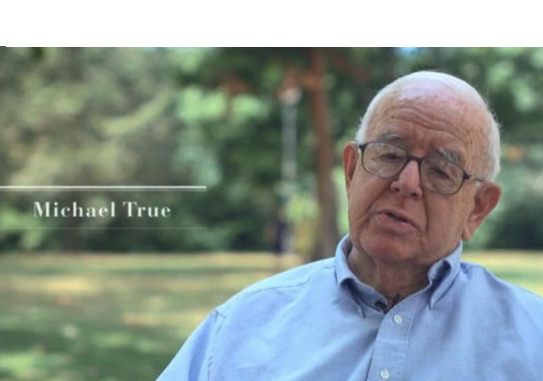FREE FLOW OF INFORMATION
A notice on thewebsite of the Center for Nonviolent Solutions
Dear Friends and Supporters;
We will not forget April of 2019, a month that brought the departure of two significant peacemakers here at the Center. On Sunday, April 28, fourteen days after board member Paul Ropp died, Center co-founder Michael True passed away. He breathed his last at sunrise which was perhaps fitting for a man who loved the morning.

Professor, author, poet, peace researcher and activist, beloved husband and father, a good and true friend to many, these varied titles only partially describe the enormity of Mike’s marvelous life. The man who taught English at Worcester’s Assumption College for many years has been aptly described as “the heart and soul” of the city’s peace community. His co-founding of the Center with Bill Densmore is merely one initiative in a long list of local peace efforts dating back to the Vietnam War. Mike supported the city’s interfaith draft counseling center, participated in acts of nonviolent civil disobedience at nuclear weapons facilities, joined a coalition to prevent the introduction of JROTC in Worcester high schools, and attended countless peace vigils and wrote countless op-eds in opposition to our countless wars.
This incomplete list reveals nothing about Mike’s extensive work promoting peace education and research nationally and internationally – his active membership in the Peace and Justice Studies Association and the International Peace Research Association; his teaching trips to India, China, North Korea, and Colombia from which he would return full of stories about peacemakers and nonviolent initiatives unknown to us. One of his great joys was to witness the flowering of peace studies – from fledgling discipline to more than 400 programs worldwide – over the course of his lifetime.
Mike was the Great Encourager, the tireless advocate of people power. He believed deeply in the capacity of ordinary folk to effect social change, and expressed that conviction in his many books, lectures, and personal support for a myriad of campaigns. He had a lifelong interest in finding a language that precisely articulated the vision of peace and the means to achieve it. Poets, he thought, told the “whole truth.” When the UN came out with its Culture of Peace documents, he was ecstatic, because finally an international body recognized what he had known all along, that individual initiative, nonviolent direct action, and people power matter. That peace really does begin with each of us. [Editor’s note: Here is an article about the initiative by Michael in 1997 in collaboration with the CPNN coordinator who, at that time, was charged with the UNESCO program.]
An invaluable mentor, Mike was also one of my most important friends. I loved his curiosity, his humor, his capacity to marvel at the abundance of goodness in the world even while bemoaning the horrors, and his remarkable attentiveness to all whom he encountered. His departure leaves a distinct loneliness.
Mike frequently recited Denise Levertov’s poem “Making Peace,” a line of which became the title for his book An Energy Field More Intense Than War. For many of us, he was “an energy field,” a friend who animated courage and hope. Perhaps our best act of gratitude for his good and generous life is to be that energy of peace for others.
A Celebration of the Life of Michael True will be held June 1 at Worcester’s Mechanics Hall. More details forthcoming.
(Article continued in the column on the right)
Where in the world can we find good leadership today?
(Article continued from the column on the left)
BY DENISE LEVERTOV
A voice from the dark called out,
‘The poets must give us
imagination of peace, to oust the intense, familiar
imagination of disaster. Peace, not only
the absence of war.’
But peace, like a poem,
is not there ahead of itself,
can’t be imagined before it is made,
can’t be known except
in the words of its making,
grammar of justice,
syntax of mutual aid.
A feeling towards it,
dimly sensing a rhythm, is all we have
until we begin to utter its metaphors,
learning them as we speak.
A line of peace might appear
if we restructured the sentence our lives are making,
revoked its reaffirmation of profit and power,
questioned our needs, allowed
long pauses . . .
A cadence of peace might balance its weight
on that different fulcrum; peace, a presence,
an energy field more intense than war,
might pulse then,
stanza by stanza into the world,
each act of living
one of its words, each word
a vibration of light—facets
of the forming crystal.